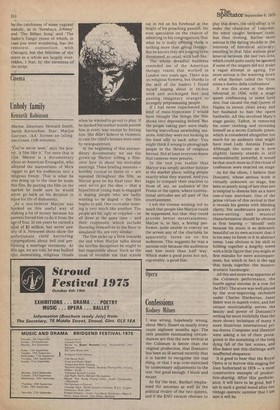Cifiema
Unholy family
Kenneth Robinson
Marjoe. Directors: Howard Smith, Sarah Kernochan. Star: Marjoe Gortner. 'AA' Screen-on-Islington-Green. (100 minutes).
'You've never seen,' says the poster, 'a film like it.' For once that is true. Marjoe is a documentary about an American Evangelist, who adopted the mannerisms of Mick Jagger to get his audiences into a religious frenzy. That is what he whs doing up to the time he made this film. By putting the film on the m,arket he made sure he would never go back on his decision to 10.ve his life of dishonesty.
As a non-believer Marjoe was hooked on this useful way of Making a lot of money because his parents forced him to do it from the age of four. In ten years he earned a t4a1 of $3 million, but never saw any of it. Newsreel shots show the unfortunate child hectoring congregations. about hell and performing a marriage ceremony. At this age, we are told, he was bullied in:to memorising religious rituals when he wanted to go out to play. If he slacked his mother would punish him in every way except by hitting him. She didn't believe in violence, in case the child's bruises were seen by newspapermen.
At the beginning of this extraordinary documentary we see the grown-up Marjoe telling a filmcrew how to shoot his revivalist meetings. These briefing sessions — horribly cynical to listen to — are repeated throughout the film, as Marjoe goes on his final tour. But once we've got the idea — that a hypocritical young man is engaged in duping people who are badly wanting to be duped — the film begins to pall. One revivalist meeting is very much like another. The people are fat, ugly or crippled — or all three at the same time — and their responses, which include throwing themselves to the floor in simulated fits, are very similar.
The film picks up a little towards the end when Marjoe talks about the terrible deceptions he ought to feel responsible about. Such as the cross of invisible ink that stands out in red on his forehead at the height of his preaching passion. He even speculates on the chance of admitting to his congregations that what he is really offering them is nothing more than group therapy. But he knows they are longing to be threatened, as usual, with hell-fire.
The whole dreadful business reminded me of the American therapy teams that worked in London two years ago. There was no religious hysteria, but thanks to the skill of the leaders I found myself leaping about in tie-less neck and stockinged feet and passing imaginary oranges to strangely prepossessing people.
If I had never experienced this kind of mass-hypnotism I would have thought the things the film shows very depressing indeed. But the people taking part were really having marvellous unwinding ses sions. And they were not looking in the least silly to each other. You might think it wrong to photograph people in the throes of religious fervour. But at least everyone knew that cameras were present.
In the end you realise that Marjoe was simply another hustler in the market place, selling people
exactly what they wanted. And you begin to compare their reaction to
those of, say, an audience at the Proms or the opera, where conventional attitudes are all part of the entertainment.
I left the cinema wishing not so much that people like Marjoe could be suppressed, but that they could provide ,better entertainment. Marjoe is, in fact, a boring per former, quite unable to convey on the screen any of the charisma he apparently turns on to his audiences. This suggests he was a success only because the audiences met him more than half way. Which make a good point but not, regrettably, a good film.


































 Previous page
Previous page